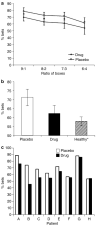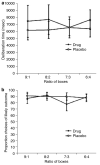Methylphenidate ('Ritalin') can ameliorate abnormal risk-taking behavior in the frontal variant of frontotemporal dementia
- PMID: 16160709
- PMCID: PMC1852060
- DOI: 10.1038/sj.npp.1300886
Methylphenidate ('Ritalin') can ameliorate abnormal risk-taking behavior in the frontal variant of frontotemporal dementia
Abstract
The frontal variant of frontotemporal dementia is a significant neurological condition worldwide. There exist few treatments available for the cognitive and behavioural sequelae of fvFTD. Previous research has shown that these patients display risky decision-making, and numerous studies have now demonstrated pathology affecting the orbitofrontal cortex. The present study uses a within-subjects, double-blind, placebo-controlled procedure to investigate the effects of a single dose of methylphenidate (40 mg) upon a range of different cognitive processes including those assessing prefrontal cortex integrity. Methylphenidate was effective in 'normalizing' the decision-making behavior of patients, such that they became less risk taking on medication, although there were no significant effects on other aspects of cognitive function, including working memory, attentional set shifting, and reversal learning. Moreover, there was an absence of the normal subjective and autonomic responses to methylphenidate seen in elderly subjects. The results are discussed in terms of the 'somatic marker' hypothesis of impaired decision-making following orbitofrontal dysfunction.
Figures


Similar articles
-
Paroxetine does not improve symptoms and impairs cognition in frontotemporal dementia: a double-blind randomized controlled trial.Psychopharmacology (Berl). 2004 Apr;172(4):400-8. doi: 10.1007/s00213-003-1686-5. Epub 2003 Dec 10. Psychopharmacology (Berl). 2004. PMID: 14666399 Clinical Trial.
-
Decision-making processes following damage to the prefrontal cortex.Brain. 2002 Mar;125(Pt 3):624-39. doi: 10.1093/brain/awf049. Brain. 2002. PMID: 11872618
-
Specific cognitive deficits in mild frontal variant frontotemporal dementia.Brain. 1999 Aug;122 ( Pt 8):1469-93. doi: 10.1093/brain/122.8.1469. Brain. 1999. PMID: 10430832
-
Methylphenidate treatment of negative symptoms in patients with dementia.J Neuropsychiatry Clin Neurosci. 1997 Spring;9(2):231-9. doi: 10.1176/jnp.9.2.231. J Neuropsychiatry Clin Neurosci. 1997. PMID: 9144102 Review.
-
Stimulants: Therapeutic actions in ADHD.Neuropsychopharmacology. 2006 Nov;31(11):2376-83. doi: 10.1038/sj.npp.1301164. Epub 2006 Jul 19. Neuropsychopharmacology. 2006. PMID: 16855530 Review.
Cited by
-
Evidence and implications of abnormal predictive coding in dementia.Brain. 2021 Dec 16;144(11):3311-3321. doi: 10.1093/brain/awab254. Brain. 2021. PMID: 34240109 Free PMC article. Review.
-
Evidence for a specialized role of the locus coeruleus noradrenergic system in cortical circuitries and behavioral operations.Brain Res. 2016 Jun 15;1641(Pt B):197-206. doi: 10.1016/j.brainres.2015.11.022. Epub 2015 Nov 25. Brain Res. 2016. PMID: 26607255 Free PMC article. Review.
-
Atypical parkinsonian syndromes: a general neurologist's perspective.Eur J Neurol. 2018 Jan;25(1):41-58. doi: 10.1111/ene.13412. Epub 2017 Sep 28. Eur J Neurol. 2018. PMID: 28803444 Free PMC article. Review.
-
Regulatory match effects on a modified Wisconsin Card Sort Task.J Int Neuropsychol Soc. 2010 Mar;16(2):352-9. doi: 10.1017/S1355617709991408. Epub 2010 Feb 3. J Int Neuropsychol Soc. 2010. PMID: 20128935 Free PMC article. Clinical Trial.
-
Treatment of the behavioral variant of frontotemporal dementia: a narrative review.Dement Neuropsychol. 2021 Jul-Sep;15(3):331-338. doi: 10.1590/1980-57642021dn15-030004. Dement Neuropsychol. 2021. PMID: 34630920 Free PMC article.
References
-
- Alexander GE, DeLong MR, Strick PL. Parallel organization of functionally segregated circuits linking basal ganglia and cortex. Ann Rev Neurosci. 1986;9:357–381. - PubMed
-
- Aron AR, Dowson JH, Sahakian BJ, Robbins TW. Methylphenidate improves response inhibition in adults with attention-deficit/hyperactivity disorder. Biol Psychiatry. 2003;54:1465–1468. - PubMed
-
- Bartzokis G, Lu PH, Beckson M, Rapoport R, Grant S, Wiseman EJ, et al. Abstinence from cocaine reduces high-risk responses on a gambling task. Neuropsychopharmacology. 2000;22:102–103. - PubMed
-
- Bechara A. Emotion, decision-making and addiction. J Gamb Stud. 2003;19:23–51. - PubMed
-
- Bechara A, Damasio H, Damasio A. Manipulation of dopamine and serotonin causes different effects on covert and overt decision-making. Soc Neurosci Abstracts. 2001;27:456.5.
Publication types
MeSH terms
Substances
Grants and funding
LinkOut - more resources
Full Text Sources
Other Literature Sources
Medical

